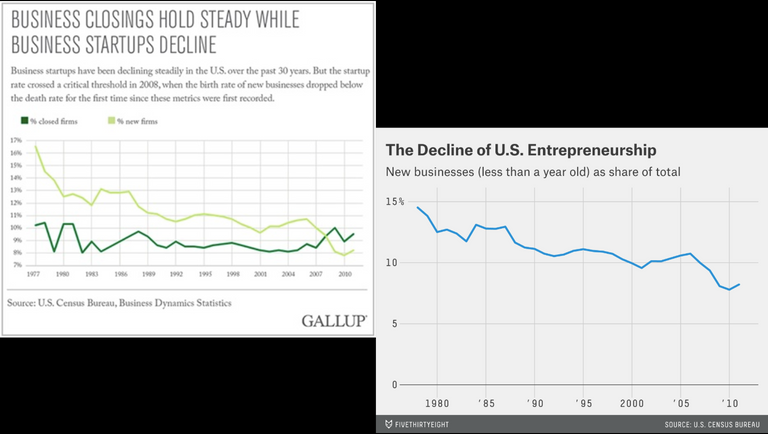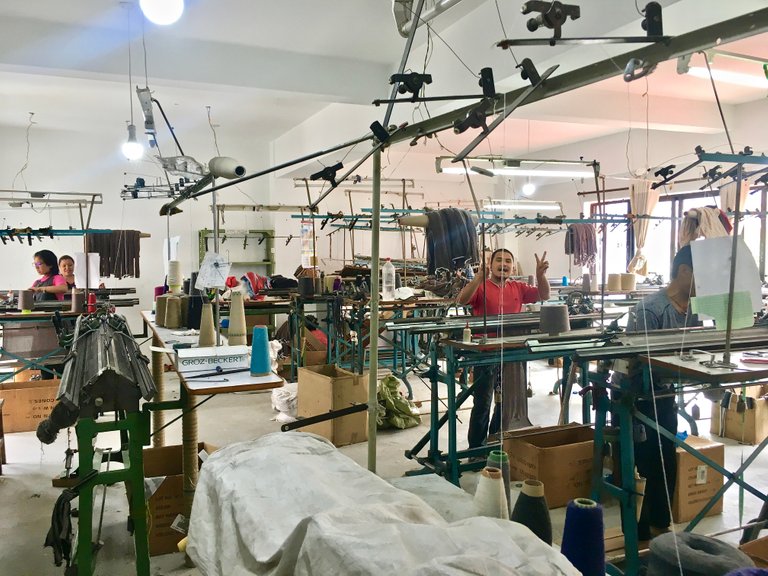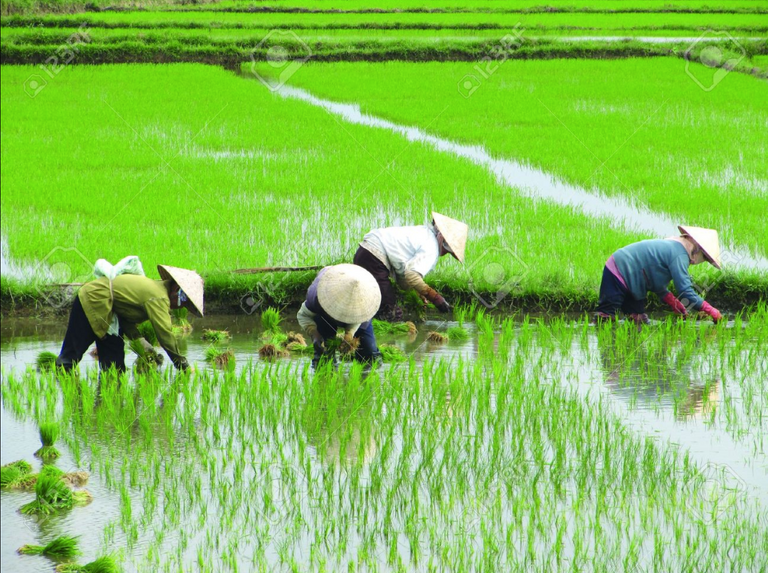As I was saying, our problem to deal with in the West is one of declining ingenuity and entrepreneurism. We must deal with it before the price tag becomes too rich. Small companies are what make our modern economy work.
If you imagine out 50 years - it won't be 15 million Canadians or 150 Million Americans being employed in a few mammoth companies.
It will be 2 to 3 million small businesses that employ the majority of people. But with startup rates in both these countries at the rates they are, we are not setting ourselves up for a prosperous and connected next 50 years.

Our current tilt towards these mega-corporations and an all time low in new business start ups is not sustainable. It will not create the jobs we need as the bedrock of a stable economy during this century.
This is what I ask myself when I think about how I may act sustainably.
- Does this action help to sustain my family, in a way that is also beneficial to society at large?
- Will it sustain our livelihoods?
- Will it sustain our planets ability to host us, now and into the future?
The story is quite opposite in China, India, Nigeria and other rapidly developing nations. Rates of entrepreneurship and new business formations are at an all time high. Beijing and Jerusalem are the #2 and #3 startup capitals of the world right behind Silicon Valley.
There is more money, more movement and more energy tan ever before. What does this allow for? First of all, a lot of money allows you room to make a lot of mistakes. If there is one thing I learned in my last position it is that when you are doing the main business driver right, you can make a lot of mistakes. We were making a lot of money providing a needed service, so we could hire, fire, experiment, open and close branch offices and iterate in a ton of risky ways - precisely because we had the runway to keep going through all these tests.
If you are doing the main business driver wrong, you only get one fuck up once. Short on resources and lax in your fundamentals the first major shift, bounced payment or risky expenditure will take you out.
Free Trade
A global "policy" of free and open trade has been at the core of our global economy for the majority of the 20th century. You could argue it has been critical for much longer than that. The idea that goods flow freely around the world from where they are made, to where they are needed is so common place as to seem simplistic now.
When I thought about manufacturing in another country, I thought of long hours worked by unhappy workers in squalid conditions. Poor pay for labor in unsafe working environments.
Those are certainly true in some cases
But "poor pay" and "unsafe conditions" are relative terms. Here's an example:
One of the most dangerous things I’ve ever done is just drive on a road between two cities in Nepal.

It was a $5 bus trip on a local bus (minivan) from Kathmandu to Pokhara. Weaving, narrow, destroyed roads with buses winging around the corner ever 30 seconds into our lane, only to adjust and swerve right at the last moment. I spent 5 hours with my heart in my throat and a pleather covered seat spring jammed into my ass.
While everyone else around me was as calm as Hindus cows.
My emerging thought, in between panic attacks was “How in the hell does anything at all get done around here?” But things do get done. People go to work. Goods move around the country. While everyone aims for a better existence.
Here's a thought experiment, via way of a personal example:
You don't have to imagine what the height of textile manufacturing looks like today. I can show you. The highest production level and most commercialized state is manifested today in Southern China.
Watch this video --> Fabric Markets of Guangzhou
And just over the Himalayan mountains into the country of Nepal there is the perfect alternate situation.

I visited this factory before purchasing a shipment of yak wool. Part of my process is to qualify my small suppliers and make sure I like how they do business. This was a small factory in an outer part of Kathmandu. People working on an optional day off, where the local transit was shut down. So they had come to work under their own steam. No dank small rooms, no pouring dye and acid into a local stream. Just small groups of people working on different tasks and chatting. Some were so eager to show me what they were working on that they let me try their machines.
So if we compare the two places, one is large and technologically advanced, while one is technologically simple and the output is small. Who is to say which is any more right? The market in Guangzhou has malls with 1500 stores in it. Each store employing a few workers, supplied by a factory which could be hundreds more. In Nepal, the small factory is run by 50-60 people working away their day.
If you hear a voice saying that the institutional factory environment of China is somehow less virtuous than the scrappy little up-comers of Nepal, I would pause and ask yourself "Why"?
There is a story in the end of Outliers: by Malcom Gladwell about cultural differences that manifested over centuries by the farming of grain in the North of China and the farming of rice in the south of China.

Rice paddies can be continuously tilled, irrigated and tended to improve the yield of crops. Wheat cannot. If you want more, you have to take up more space.
So a difference of work ethic developed. In the South the farmers were used to looking at ways to improve what space they had. Making their limited resources actually do more. One only needs to take a trip to Hong Kong to see how this mindset has instantiated itself into a whole city and beyond.
In the North they looked for more space to spread their crops.
When you have limited space, it seems you learn to work better with others. You are less confrontational, more communal.
I can tell you from my personal experience this comes out in ways you would not expect. Everyone I met in Southern China is an acquaintance. Very polite. But you are kept as an acquaintance to them. Not loved, not hated. I think it is because one day you might have to end up working with each other. Being acquaintances means a good arms length relationship. Familiar, but stable enough to work together well.
The small factory that employs 40 to 50 people can be more tenuous, but can also be more stable. Companies less focused on growth are often focused on other things such as development of personnel or improvement of product
If this industry in Nepal around wool and cotton production turns into a booming industry. Then continues for 20 years, so that countless players are able to compete in it. Seemingly endless new players and products enter the space. Then it starts to move in direction of an industry populated by Super Malls and garment districts. At what point of growth does a small industry in boom suddenly cross over this point of supposed "big business" evil?
Is it once it supports the 501st family?
Behind the obscured window of big business, might it not just be 500 factories like this one in Nepal? Smiling workers, that had come in voluntarily on a holiday so that they could get a few more hours. Working in a job that is good by local standards, and pushing for more as they do so.
This to me kills the idea that size of a business has anything to do with its virtue.
Check out my other posts on Steem @
- https://steemit.com/capitalism/@almostfitz/sustainable-standards-and-free-trade-pt-4
- https://steemit.com/nepal/@almostfitz/sustainable-standards-and-free-trade-pt-3
- https://steemit.com/startup/@almostfitz/sustainable-standards-and-free-trade-pt-2
- https://steemit.com/trade/@almostfitz/sustainable-standards-and-free-trade-pt-1
- https://steemit.com/risk/@almostfitz/day-411-you-vs-the-ledger
- https://steemit.com/pareto/@almostfitz/day-404-the-pareto-demon
- https://steemit.com/problems/@almostfitz/yeah-sure-wake-up
- https://steemit.com/problems/@almostfitz/solve-interesting-problems
- https://steemit.com/work/@almostfitz/bringing-it-home
- https://steemit.com/timing/@almostfitz/timing-is-everything
- https://steemit.com/startup/@almostfitz/today-is-free
- https://steemit.com/funding/@almostfitz/think-local-act-global
- https://steemit.com/revenue/@almostfitz/day-4-369-the-wheel-turns-all-ways
- https://steemit.com/insurance/@almostfitz/day-3-368-what-aren-t-you-insured-for
- https://steemit.com/startup/@almostfitz/day-2-find-funding-day-367-find-customers
- https://steemit.com/startup/@almostfitz/the-day-it-all-started
- https://steemit.com/startup/@almostfitz/experimenting-with-the-bogo-3-0-business-model
- https://steemit.com/startup/@almostfitz/why-this-business-data-confidence-and-shit-testing
- https://steemit.com/startup/@almostfitz/why-this-business-set-your-anchors-deep
- https://steemit.com/travel/@almostfitz/tourists-pull-your-head-out-of-your-ass
- https://steemit.com/worst/@almostfitz/the-potential-freedom-in-being-the-world-s-worst-entrepreneur-
- https://steemit.com/business/@almostfitz/open-for-business-11-pictures-about-launching-a-startup-speak-11-000-words
Check out my posts on my other blog on my Shopify store @
Congratulations @almostfitz! You have completed the following achievement on the Steem blockchain and have been rewarded with new badge(s) :
You can view your badges on your Steem Board and compare to others on the Steem Ranking
If you no longer want to receive notifications, reply to this comment with the word
STOPTo support your work, I also upvoted your post!
Vote for @Steemitboard as a witness to get one more award and increased upvotes!